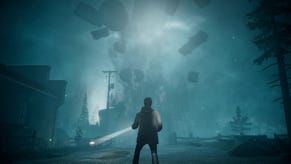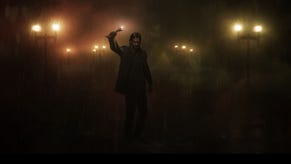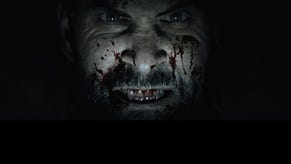Scandimania: Adventures in Finnish games, part two
The second part of our tour of the Finnish games industry, in which Patrick Garratt sees Alan Wake's American Nightmare, travels from Helsinki to Tampere and tries to navigate a blizzard using a game on an ancient Nokia phone.
Read part one of this feature here.
The day’s less dull when we leave the Helsinki World Trade Centre to walk the short distance to Super Stardust developer Housemarque. The office is typical of the north, with its black iron cage lift and the washed-out, Sovietish metalism you see replicated in the frozen band across the top of Europe from Russia to Iceland. Housemarque is one of Finland’s oldest developers, having been founded by Harri Tikkanen and Ilari Kuittinen in 1995, and is most recently responsible for zombie shooter Dead Nation and Ubisoft-published 2D action adventure Outland. The company’s focus has been purely digital in recent years - towards XBLA, PSN, iOS, Vita, and so on - although Kuittinen says “that’s not entirely true any more"; Housesmarque has an unannounced retail PS3 and 360 game for 2012, an "interesting departure from what we've done in the past".
Housemarque is a Finnish developer trying to find its place in the new digital market. While its traditional focus has been at the core, it’s about to release an iOS puzzler called Furmins, a self-funded, self-published game designed to “test the waters" of new genres. We see it being played, and it’s absolutely not what you’d expect from the studio. Furmins is a clever, cutesy touch-puzzler with painterly backgrounds; there's no trace of "shooting" whatsoever.
The company itself is relatively large; it has 31 staff and an R&D team. It’s working on the Vita version of Super Stardust, and has achieved around 4 million downloads of PSN’s Dead Nation so far. Housemarque recently self-financed some Dead Nation DLC giving the developer a “pretty good deal" with Sony. Kuittinen describes this as a “half-step" towards ditching publishing and funding partners completely.
Outland - Housemarque’s beautiful, critically acclaimed platformer - fell victim of 2011’s PSN outage, as did Recoil’s Rochard, and released late in June 2011 after an initial XBLA ship. It took two years to make Outland with a team of ten people. Ubisoft’s already told Kuittinen it doesn’t want a sequel.
“I feel Dead Nation and Outland were some of the bigger, higher quality titles out there, and by this time I would have hoped that they would have both done much better," he says. “But the marketplace hasn’t grown at the pace of console penetration; I think there are things waiting to break through in the next generation."
“I feel Dead Nation and Outland were some of the bigger, higher quality titles out there, and by this time I would have hoped that they would have both done much better. But the marketplace hasn’t grown at the pace of console penetration; I think there are things waiting to break through in the next generation."
Housemarque is busy and will continue to succeed. It makes great games. But Kuittinen is on his toes. Independent development is no easy ride, whether you’re Finnish or not. He’s constantly having to build new games, invest in new directions and try to match a market shifting at light-speed. He’s under no illusions as to the difficulties he’ll face getting Furmins noticed in the brutal world of iOS app sales. It’s built on the same engine as Super Stardust HD, Dead Nation and Outland, and has taken three years to make. The risk is obvious and real: with such an glut of content hitting the App Store every day, gaining visibility is a nightmare. He’s spent hundreds of thousands of euros on it and it simply may not sell.
“It’s like throwing a stone into a lake," he says.
We’re driven to Remedy in Espoo, a Helsinki satellite town surrounded by Finland’s ubiquitous beech woods. Remedy developed Alan Wake and the original Max Payne, and is, by far, the most visible core developer in Finland. Well-known franchise head Oskari Häkkinen and MD Matias Myllyrinne meet us at the door. This is the type of studio I’m used to visiting. It’s triple-A: slick, large, multi-floor and fronted by carefully chosen words - on or off the record. We’re allowed to see nothing of Remedy’s work environment. While it’s easy for me to feel as though I’m back in my comfort zone, we’re about to see first-hand just how drastically the market has moved for Finnish developers, even an outfit as well known as Remedy.
We’re the first journalists in the world to see Alan Wake’s American Nightmare, watching Häkkinen and Myllyrinne deliver a note-perfect pitch in a giant boardroom. It’s download-only, an action-heavy stop-gap to what is widely assumed to be a full sequel. It may be short at around four hours, but this is a triple-A production; the fact it won’t be released on a disc is significant. If the games world is going digital, Finland is at the change’s cutting edge.
The format, though, has dictated the need to focus on action. Häkkinen admits it’s “for the digital space, made for the medium." But it’s a standalone spin-off Myllyrinne thinks will challenge XBLA conventions as it’s a “hardcore, cinematic action game."
He adds: “Stepping back from the game, we’ve been looking at how the environment’s been changing, how the eco-system’s been changing, and I think it’s becoming more and more viable for teams such as Remedy to create digital experiences, to do those much quicker and to listen to people. We’ve done that with the gameplay, and I hope we’ll be able to do that in the future with much more rapid iterations. I think that would be really cool.
“The good part about crafting something for five years is crafting something for five years, but the bad part is that you’re not necessarily constantly in touch with your fanbase."
Over lunch, Myllyrinne offers a skewed perspective on the modern trend in Finland to push money into tiny start-ups. He says the current investment in mobile and social is different from the 90s dotbomb disaster, as there’s a genuine market and the revenue is real. He is, however, unsure about how easy it’ll be to acquire users in such a crowded space. That Zynga audience may be hugely expensive to catch.
Meeting Matias is fun. He’s a colourful character. When the USSR collapsed in the early 90s, Finland was thrown into a deep recession thanks to severed trade; Myllyrinne left for the UK. He tells me about a past working in London hotels, and how he had to throw Busta Rhymes out of one so he could accommodate Jacques Chirac. He once showed an Israeli premier to his room, sharing a lift with Uzi-touting Mossad men. I mention I’ve been considering doing some mainstream journalism recently and have been looking at Africa as a potential topic, and he recounts a childhood in Tanzania and the Phillipines, adding stories about paying “sanitation fees" at the Kosovo border to guards who insisted on washing his car's wheels. His English is remarkable. I mistake him as American; he is, obviously, Finnish.
Our group is given pause for air on the pavement outside Remedy. There are some white faces in the group. It’s been endless presentations for days, and we’re not done yet. It’s much colder now, and dark. We’re driven to something called the Start-up Sauna, the home of Aaltoes, or Aalto Entrepreneurship Society in full. It's “Europe’s largest and most active entrepreneurship community". I’m going cross-eyed. There are portable saunas in the carpark of what we now see is a brightly lit industrial unit. I had visions of being forced to strip down for some giant steamroom crammed full of half-starved post-grads dressed only in government-supplied euro notes. The reality, it transpires, isn’t that far removed.
We’re about to experience one of the most hilariously inventive games you’ve never heard of. And Eeva’s smiling; it’s finally started to snow.
Velvet Sundown
“This place has changed a lot since I was last here," says Eeva. “It was empty with a few tables. They got more money."
The Start-up Sauna is a huge, stark white warehouse attached to the Aalto University, a new college formed by merging the Helsinki University of Technology, the Helsinki School of Economics and the University of Art and Design Helsinki in 2010. The facility provides 700 square metres of free office space for “hackers and start-ups". It’s the only seed incubator “in town," according to French Canadian Natalie Gaudet, and one of the largest student bodies in northern Europe. We start to get a real sense about just how new Finland’s start-up fever really is.
“Back then, two years ago, there were no entrepreneurship activities," says Gaudet. “There were some entrepreneurs, and there were some start-ups, but they were isolated, working on their own. There wasn’t any community or ecosystem."
She adds: “You have to understand something about the culture in Finland. A couple of years ago, people weren’t that proud of calling themselves entrepreneurs. As an example, one guy started his company while he was in university, and he didn’t even tell him classmates that he was an entrepreneur. He kept it silent. So, the main mission of the Aalto Entrepreneurship Society is make entrepreneurs rock stars.
“The culture is changing here in Finland. We’re getting a lot of media attention. Politicians are looking for guidance from this group of students."
While the Start-up Sauna is a space for any strand of start-up, games are some of its most exciting projects. Some 40 “coaches" mentor the start-ups here, of which Rovio’s Peter Vesterbacka and Lifeline’s Petteri Koponen are two. We’re taken upstairs to a meet Tribes Studios, a start-up made of an experienced team of developers that previously worked at traditional studios like Bugbear. Company head Elina Arponen talks us through Stagecraft, a platform that allows people to play short multiplayer games on PC. The first title is Velvet Sundown.
The concept is simple and unique. Velvet Sundown is set on a luxury yacht, and has a “cast" of 6-11 players. Each player, in theory, becomes the protagonist. It’s a mystery in a Colonel-Mustard-in-the-kitchen style, with everyone having goals to accomplish. I’m a drug addict called Shauna. I have some car keys, and I can’t let my car rot. I have no idea what’s going on. I walk around the full 3D environment and immediately find a bar. The bartender’s Keza, but I think she’s a bot as she’s playing in character. Within five minutes there’s a group of us out on the front of the boat typing as quickly as possible about pearl necklaces, necrophilia, murder and t*ts. At one point, someone’s shouting at a man called Cooper to “wank on Linda". There’s no “action". It’s just us walking around talking. It’s a deeply funny experience.
Velvet Sundown’s supposedly out early this year, but it’s still in beta and seems early. In the prototype, someone creates a game and invites friends to play, but in the full release the plan it to have scheduled “shows," where you turn up at 8.00pm, for example, and play for an hour. Arponen says scheduling this way will make it easier in the early days to get the games full. Each session has a storyline; things will happen during play to alter social mechanics. This isn’t in the version we played, but it’s easy to see the Stagecraft’s potential. You can sign up for the beta now.
Out into the snow and up onto the bus, everyone’s clearly excited by Velvet Sundown. In practice it unfolds as a bizarre social experiment, with some taking to their characters and others trolling, but the goals drive the narrative as everyone’s forced to make compromises to “win". No one can work out who won what, or if winning was even relevant. As we jabber on, our driver takes us out of Helsinki and on the 200km drive through Finland’s winter blackness to Tampere, the country’s second city.
We stop at an ABC service station to p**s and pick up water. It’s covered in slush. I walk in to the shop to find Caleb and Matt giggling uncontrollably at a magazine called Kissafani; it’s for cat fanciers. We also find a publication called Presidentit and a bag of crisps called Sips with “Minipussi" written on the bag. The Europeans look as tired as the Americans at this point, and there’s a round of beer. Eeva gives us chocolate. We get caught up in traffic and the bus gets smashed with sleet. It’s a dirty night. I’m glad of bed when we finally reach the hotel.
When Scottish industrialist James Finlayson set up his Tampere mill in 1820, he built it to last. His decision to invest in the city marked the beginning of its development; it’s now the largest non-coastal centre in the entire Nordic region. The New Factory, another seed accelerator, is the latest venture to inhabit Mr Finlayson’s austere building, and is yet again symbolic of a shift from Finland’s old industrialism to its new entrepreneurs. Some 70% of the start-ups residing in New Factory are mobile developers.
Tampere is home to 23 games firms which employ a total of 70 staff, ManseGames rep Suvi Latva tells us. Rovio's setting up an office for 25 employees here next year. There are game development clubs in local schools in Tampere. In recent years, the importance of games to the old industrial centres in Finland has clearer risen massively.
Even in the last year, New Factory director Jukka Matikainen says, "the start-up spirit" has changed vastly. “It was normal to spend five years at the university to get a technical degree, and then just cross the road to work. Start-up culture is like pop culture now. It's cool to be an entrepreneur."
New Factory’s major success is music training game WildChords, made by Ovelin, a start-up headed by Mikko Kaipainen. He tells us that 85% of people that start to play an instrument quit through lack of motivation. The iPad game, released last November, is a sort of modern Pied Piper; the animals have escaped from the zoo and you have to capture them again by playing the right notes.
WildChords is an example of a small idea that obviously works. It’s been featured on TechCrunch and the Guardian. It’s won awards. Eli, the TouchArcade journalist, is impressed.
"It's really cool," he says, and Suvi and Mikko share a grin.
I’m reasonably delirious at this point. I'm monumentally over-caffeinated and appear to have adopted a rictus grin. I’ve been start-upped. Jouni Salonen from iOS developer Tuokio shows us King of Opera with slides of kids in Hong Kong playing the mental Hungry Hippo-alike on iPad. We play it. It’s funny. Jouni says sales are going well as we’re ushered into a back-room full of Nokia suits with tech demos. These guys seems awkward by comparison to the seedsters, older and dressed in richer clothes. It’s jarring, a look back at the old world. They’re here because Nokia provides funding for New Factory, and they show us real-time photo editing in a browser and “the bendy phone". This is genuinely interesting, and could have a real impact on mobile games if it’s adopted wholesale. You affect the UI by bending the phone. It’s hooked up to a motherboard at the moment, but it does work. You can turn volume up and down, zoom in on pictures and all the rest of it by physically flexing the device. Start-ups are all well and good, but those giant R&D budgets are going to be vital for the smaller firms in the future.
Our last stop of the visit is at the office of Tamere developer 10tons. CEO Tero Alatalo walks us through Swingworm, a just-released iOS puzzler. 10tons was founded in 2003, managed to support employees in 2006, and released its first game in 2008.
They use word of mouth for marketing, and describe visibility as one of the “great challenges" of iOS development. Editorial coverage, Tero, says, is a key way of selling mobile games.
We see Azkend 2 on iPad. I’ve never heard of it, but it’s great. It’s a puzzle game with a seafaring theme, where you draw lines to gets rid of motifs on a hex grid. I’m so tired I can’t stop playing it.
Once 10tons is finished, another company, Team Action Zone, arrives and presents to us in the same room. Brady, sitting opposite me, is actually asleep. TAZ is run largely by ex-Nokia engineers, and provides real-world location-based games on phones. CEO Kari Laurila tells us of the idea of getting people to exercise by following location markers, with games of up to up to 200-300 players. A 500-person event is coming early next year.
At one point in this demo, Laurila shows us a prototype motion handset he worked on at Nokia, which was supposed to be something similar to a Wiimote. This is all in the vein of exercise. I’m drifting in and out. We see another version of the TAZ software that has you running backwards and forwards on your street avoiding falling objects on your phone. We’re well into “gamification" territory here, but I don’t care. The running backwards and forwards thing looks funny.
Laurila and his team finish by taking us to the pub. We have to find our way there using a TAZ game on a basic Nokia handset. Finland’s capacity for snow is suddenly laid bare: it’s a blizzard. We’re walking down streets trying to “trap" each other for no reason we know. We’ll all laughing hysterically.
Then we’re standing in a bar. Some’s ordering glögi, the traditional Finnish mulled wine. We all put the phones on the table and I can see Laurila searching out faces for reaction.
And then i get it. This entire trip’s confused me. VG247’s about the core, about shooters, action and industry; I’ve been looking at iOS games and hearing about the lighting of the disc-burning pile, trudging through the snow clutching an ancient mobile phone. It hasn’t made sense. But Laurila, the ex-Nokia man, pushing out on his own to invent a new genre of videogame is as magnificent as it is insane as it is necessary. Every time we showed any kind of positivity in the last few days, eyes sparkled and glances were exchanged. We saw it at the Start-up Sauna with the Velvet Sundown team, and between Suvi and Mikko over WildChords.
I get goosebumps. I remember what it's like to realise you have something, that it genuinely can work, that you've found a gap; what it's like to go beyond knocking ideas round a table to someone begrudgingly agreeing to funding, to the gut-bursting thrill that it's actually happening. It's not greed. It's practical creativity brought on by ubiquitous, connected technology and the decline - for good or no - of the old business world of manufacturing, of discs and old skool mentality. The people we’ve met in Finland are just guys with ideas and they want to make them work. They don't want "a boss" or "a job": jobs aren't safe any more. It's wanting to be free, to have a future. The Finnish start-up scene is a microcosmic view of the global games trade, of the collapse of triple-A for anything other than the biggest developers and the explosion in mobile, browser and tablet. The fact that I, a core games journalist, am even being shown this stuff speaks volumes.
This isn’t the new Finnish games industry: it’s the new games industry. Ignore it at your peril.
Read part one of this feature here.










.jpg?width=291&height=164&fit=crop&quality=80&format=jpg&auto=webp)



